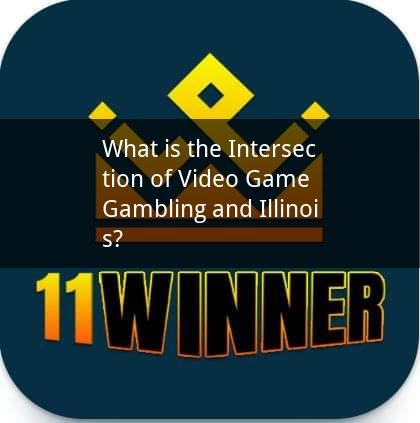
Table of Contents
1. Introduction to Video Game Gambling in Illinois
2. The Evolution of Video Game Gambling
3. The Legal Landscape in Illinois
4. The Economic Impact of Video Game Gambling
5. Psychological Aspects of Video Game Gambling
6. Comparative Analysis: Traditional Gambling vs. Video Game Gambling
7. Real-Life Scenarios: Testimonies and Case Studies
8. Community Perspectives and Reactions
9. Challenges and Solutions in Combating Video Game Gambling
10. Conclusion
---
1. Introduction to Video Game Gambling in Illinois
Have you ever wondered what happens when the thrill of a video game meets the risk of gambling? In Illinois, this intersection has sparked a debate that transcends the realm of virtual entertainment. Video game gambling, often referred to as "loot boxes" or "microtransactions," has become a prevalent issue, especially among younger demographics.
2. The Evolution of Video Game Gambling
Once seen as a mere in-game feature, the concept of loot boxes has evolved into a lucrative business model for video game developers. The evolution has been marked by the increasing complexity of these boxes, which often promise exclusive in-game items that can be sold or traded for real money.
3. The Legal Landscape in Illinois
Illinois has been at the forefront of addressing the legal implications of video game gambling. In 2019, the state passed a law requiring video game companies to disclose the odds of obtaining rare items from loot boxes. This move aimed to provide transparency and protect consumers, particularly minors, from potential harm.
4. The Economic Impact of Video Game Gambling
The economic impact of video game gambling in Illinois is substantial. According to a report by the Entertainment Software Association, the gaming industry in Illinois generated over $2 billion in revenue in 2020. However, the debate rages on regarding the long-term economic implications of this burgeoning sector.
5. Psychological Aspects of Video Game Gambling
Psychologists have raised concerns about the psychological aspects of video game gambling. The thrill of the unknown, coupled with the potential for immediate rewards, can create a psychological addiction that mimics traditional gambling behaviors. This section explores the psychological effects and compares them to traditional gambling.
6. Comparative Analysis: Traditional Gambling vs. Video Game Gambling
A comparative analysis of traditional gambling and video game gambling reveals several key differences. While traditional gambling involves physical venues and face-to-face interactions, video game gambling is often conducted in the comfort of one's home, using a personal device. This shift in format has implications for accessibility, regulation, and the potential for addiction.
7. Real-Life Scenarios: Testimonies and Case Studies
Real-life scenarios and case studies provide a glimpse into the world of video game gambling. From teenagers spending thousands of dollars on virtual items to parents discovering their children's involvement in these activities, these stories highlight the consequences of video game gambling.
8. Community Perspectives and Reactions
The community's perspective on video game gambling in Illinois is diverse. While some argue that it is a harmless form of entertainment, others are concerned about the potential for addiction and the impact on minors. This section explores the various viewpoints and reactions from different segments of the community.
9. Challenges and Solutions in Combating Video Game Gambling
Combating video game gambling in Illinois presents several challenges. One of the primary challenges is the rapid evolution of the industry, which makes it difficult for regulators to keep pace. This section discusses potential solutions, including stricter regulations, public awareness campaigns, and the development of responsible gaming tools.
---
Conclusion
The intersection of video game gambling and Illinois has become a complex and multifaceted issue. As the industry continues to evolve, it is crucial for policymakers, developers, and the community to work together to address the challenges and ensure a safe and responsible gaming environment.
---
FAQs
Q1: How does video game gambling differ from traditional gambling?
A1: Video game gambling primarily occurs within the virtual world of video games, often through in-game purchases or loot boxes. Traditional gambling typically involves physical venues and face-to-face interactions.
Q2: Are loot boxes considered gambling?
A2: Yes, loot boxes are often considered gambling due to their random nature and the potential for players to spend real money in the hope of obtaining valuable in-game items.
Q3: Can video game gambling lead to addiction?
A3: Yes, video game gambling can lead to addiction, as it shares many similarities with traditional gambling, including the potential for psychological dependency and financial loss.
Q4: What measures can be taken to prevent video game gambling addiction?
A4: Measures include implementing parental controls, age verification for in-game purchases, and public awareness campaigns to educate players about the risks.
Q5: How is Illinois addressing the issue of video game gambling?
A5: Illinois has passed laws requiring video game companies to disclose the odds of obtaining rare items from loot boxes and is exploring further regulations to protect consumers, particularly minors.